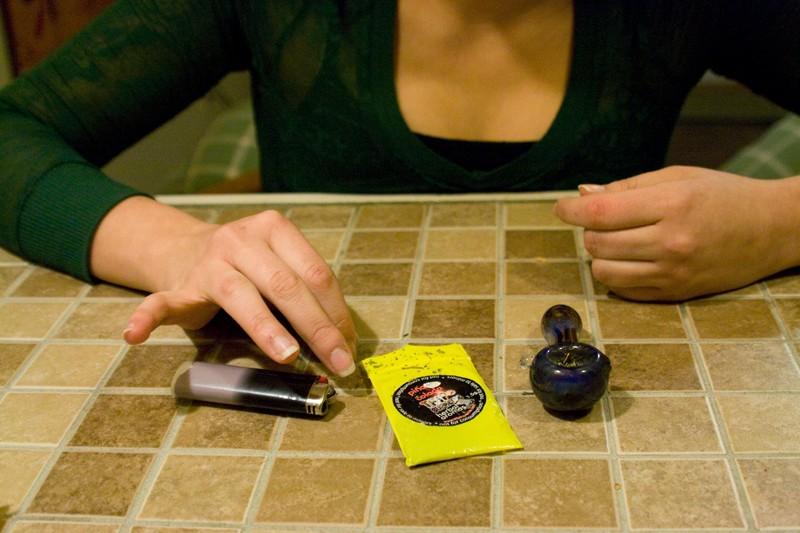Synthetic marijuana use on the rise

GVL / Andrea Baker Synthetic drugs such as K2 have seen an increase in use at GVSU
Feb 16, 2012
While marijuana has long been the most common drug encountered
on campus by Grand Valley State University police, officers are noticing the emergence of a new — and potentially more dangerous — drug: K2.
K2, also known as “Spice,” is a dried herbal blend sprayed with analgesic chemicals that creates a high similar to marijuana. K2 is the catch-all term for a number of specific brand names, including Genie and Demon. The drug recently came into the national spotlight when actress Demi Moore was rushed to the hospital after exhibiting seizure-like symptoms, allegedly induced by smoking synthetic marijuana.
K2 is intended to be used as incense and most packages contain labels stating it is not for human consumption. Capt. Brandon DeHaan, assistant director of the Grand Valley Police Department, said his officers are receiving an increasing number of calls for service related to students who have used synthetic marijuana, four in the past month alone.
“They often are becoming ill and we are responding to calls for service,” DeHaan said. “I talked to the Ottawa County Fire Department and I know last summer they also took four of these individuals (to the hospital).”
DeHaan said several of the individuals the GVPD interacted with reported a “stupefying” effect after consuming synthetic marijuana. According to the Michigan Department of Community Health, other reported side effects of K2 include heart palpitations, respiratory issues, panic attacks, hallucinations, vomiting, delusions, increased agitation and dilated pupils.
Eric Klingensmith, director of the Marijuana & Alcohol Campus Education & Services (MACES), said that while all illicit substances have the potential to induce bizarre or harmful reactions depending on the user, synthetic marijuana carries a greater risk of side effects than regular marijuana.
“Some people can have paranoia or other bizarre reactions to marijuana but it’s not as expected,” he said. “With K2, it’s much more frequent for someone to have that.”
DeHaan said when DPS encounters synthetic marijuana, officers confiscate the material and send it to the state lab to determine if it contains legal or illegal materials. While particular brands of K2 are illegal in the state of Michigan, depending upon which chemicals are sprayed on the herbs, others remain legal and can be purchased in convenience stores. Many brands simply make slight changes to their chemical formula in order to get around bans of particular chemical agents.
“That’s the hard part with synthetic drugs is if they make it illegal, by altering it slightly it becomes a whole different substance,” Klingensmith said.
K2’s relatively easy accessibility, coupled with the fact that it is untraceable on drug screening tests within a few hours after use, have contributed to its increasing popularity as an alternative to marijuana.
The MACES program already addresses the topic of synthetic marijuana and Klingensmith said some students have the perception that if a substance is not illegal, than it’s not dangerous.
“I think at least from the couple people I’ve talked to, it’s more about that it’s synthetic so it’s not ‘real marijuana’ and it’s legal so it must be different,” he said.
However, since GVSU is an institution that receives federal funding, by law, no individuals — even those with medical marijuana cards — are allowed to consume or possess marijuana on the campus.
“We have some concern with individuals consuming these products,” DeHaan said. “First off, smoking is not allowed in any of our housing units. The use or possession of marijuana is illegal… There’s a lack of understanding of the short-term effects and more importantly the long-term effects of these chemicals (in synthetic marijuana). There’s a quality of life issue revolving around students and their families living in a clean, welcoming and relatively safe environment. When students are engaging in the consumption of mind-altering chemicals, that’s a problem.”
In addition to the growing number of calls for service regarding K2, overall drug incidents and arrests have increased at GVSU as well. Official police statistics reported 19 incidents and 29 arrests in 2008; 26 incidents and 24 arrests in 2009 and 28 incidents and 56 arrests in 2010. Preliminary statistics for 2011 showed 38 incidents and 63 arrests. DeHaan said the “vast majority” of these cases involved marijuana.

























